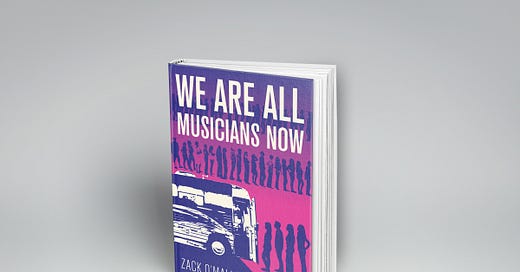What Does “We Are All Musicians Now” Actually Mean? [WAAMN Prologue]
My favorite fintech startup founder explains.
This is the weekly installment of my new book, We Are All Musicians Now. To make sure you don’t miss future serializations, subscribe here. Below you’ll find the Prologue. Enjoy!
<< PREVIOUS CHAPTER << || TABLE OF CONTENTS || >> NEXT CHAPTER >>
In 1997, 12-year-old me walked into a Blockbuster on 56th Street and First Avenue and emerged with the first thr…
Keep reading with a 7-day free trial
Subscribe to ZOGBLOG by Zack O'Malley Greenburg to keep reading this post and get 7 days of free access to the full post archives.





